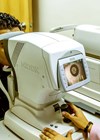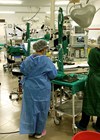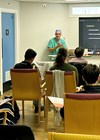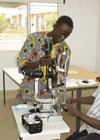Ophthalmology
Blinded by an Ofsted inspection
Introduction The Association of Health Professions in Ophthalmology (AHPO) is a charity, whose objectives are to promote the practice, education, training and research in ophthalmology and vision science in the UK. The extraordinary developments in diagnostic equipment and technologies have...
The work of RNIB and ECLOs
With more than 2,000,000 people in the UK living with some degree of sight loss and over 300,000 registered as blind or partially sighted, it is important for anyone living with sight loss to know they’re not alone. At what...
Observership in Dar es Salaam
In this report, both authors present their personal experiences of an observership at the Comprehensive Community Based Rehabilitation in Tanzania (CCBRT) Hospital, a large regional teaching hospital located in Dar es Salaam, with a particular focus on resource management, attitudes...
My top five: A foundation doctor’s top five misconceptions about ophthalmology
Choosing a specialty is challenging. As a foundation doctor, it often feels as if this choice is based solely on fleeting experiences. Compared to other specialties, there is relatively little exposure to ophthalmology during either medical school or foundation years....
From novice to overnight on-calls: developing an ophthalmology bootcamp to ease the learning curve for new trainees
Introduction My first ophthalmology on-call was nine years ago and it was a fairly traumatic experience. I was an FY2 in a Welsh district general hospital and I was on my own – at least, that’s how it felt to...
My top five: Influential ophthalmologists
Ophthalmology has witnessed remarkable evolution and advancements throughout history. The field has undergone dramatic change and development since the times of Ancient Egypt where the first reference to eyes was made in the Code of Hammurabi (2250 BC) [1]. From...
Impact of Eye Health Surveys and Partnerships in The Gambia
This article brings together the three national eye health surveys that have been undertaken in The Gambia between 1986 and 2019 and the impact that the results have had nationally and internationally. In it we describe the long-term capacity-strengthening for...
Second sight: Ian McKinley
I have always been captivated by a true-life story demonstrating the human spirit of triumph over adversity. For me, one of the most memorable sportsmen overcoming an injury has always been the mountaineer Joe Simpson and his tale of survival...
The New Zealand National Eye Centre and the land of the long white cloud
Located southeast of Australia in the South Pacific Ocean, New Zealand (Aotearoa) is home to five million culturally diverse people. Renowned for its lush nature spanning from unexplored forests to active volcanos and snow-capped mountains, New Zealand has become both...
Where are they now?
The Eye News and University of Edinburgh teams last met up with Zomba-based Dr Chinsisi Namate Nyirenda, in Glasgow, May 2022, when she was a member of The Ophthalmological Society of Malawi’s delegation to the Royal College of Ophthalmologists Annual...
Work experience in ophthalmology as an A-Level student
Importance of work experience Medical schools expect applicants to understand what a career in medicine involves, which can be gained through work experience and volunteering. It is strongly recommended by the Medical Schools Council that work experience involves working in...
Competition ratios: Is the future of ophthalmology too bright?
In the UK, ophthalmology is a highly competitive speciality, attracting many medical graduates keen to pursue a career in this area. However, in recent years, the competition ratios for ophthalmology ST1 training posts have increased significantly, creating a challenging environment...
















